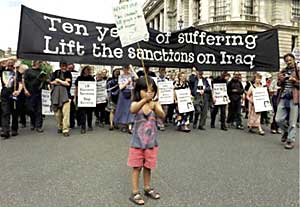Excerpted from the Sunday, August 13, 2000 Baltimore Sun:
Radicalized By US Disregard For Iraqi People
by Robert Jensen
DENIS HALLIDAY spent 34 years in the bureaucracy of the United Nations, rising to assistant secretary general as he ran development programs around the world and managed the human resources office.
In September 1997, he took over as humanitarian coordinator in Iraq, where he saw first-hand the results of a policy he now calls genocidal. The economic embargo, which is technically imposed by the United Nations but remains in place because the United States demands it, has killed at least 1 million innocent Iraqis, at least half younger than 5, according to U.N. studies.
Halliday's resignation-in-protest in October 1998 pushed him into
public view, where for two years he has talked in increasingly more radical
terms, going so far as to say that the past two U.S. presidents are guilty
of war crimes and crimes against humanity in Iraq. 
From the beginning, Halliday has made it clear that even if the sanctions had the effect of blocking Iraqi weapons plans, it is unacceptable to knowingly let innocents die to accomplish that.
He also has always pointed out that instead of helping the Iraqi people bring about a democratic government, the sanctions have strengthened Hussein's control over the country and left the Iraqi people isolated and alienated.
His assessment of the policies and the leaders of the United States and Britain has grown more blunt over time. In an interview last month with an Egyptian newspaper, Halliday said genocide was the appropriate term for "an intentional program to destroy a culture, a people, a country."
In the course of the gulf war, the U.S. officials "broke international law and the Geneva Conventions. They deliberately targeted the civilian infrastructure -- committing crimes against humanity," Halliday said.
Halliday also has been blunt in analyzing U.S. motivations: "To control the financial and oil resources of the Arab world in order to provide opportunities to sell American weapons and the American Army."
"The Americans have got what they wanted," he said. "Who cares about 6,000 to 7,000 people dying every month?"
Halliday cares, which is why he resigned rather than stage-manage a humanitarian program that was by design inadequate to meet the needs of Iraqis.
In the past year Halliday's successor, Hans von Sponeck, also resigned in protest, as did the director of the World Food Program in Iraq, Jutta Burghardt. Slowly, the anti-sanctions movement has gained strength. Last Sunday, about 1,000 activists protested in Washington, marking the day the atomic bomb was dropped on Hiroshima 55 years ago and 10 years of sanctions against Iraq.
Now an international movement is working to lift the embargo so that Iraq can begin rebuilding a society devastated by the destruction of the Persian Gulf war, the strangulation of the sanctions, and the ongoing (and quite illegal) U.S./British bombing campaign in the so-called "no-fly zones."
Although Halliday is one of the most public people in the anti-sanctions movement, his experience mirrors that of many I've talked to. Americans who want to believe that their government takes seriously the ideals of peace and justice have had to face a painful reality: U.S. officials are willing to kill children and other innocent people, especially nonwhites in the Third World, to protect and extend U.S. power. That fact has turned many mainstream folks into radicals.
Robert Jensen is a professor in the Department of Journalism
at the University of Texas at Austin. He can be reached at jensen@uts.cc.utexas.edu
![]()
![]()
![]()